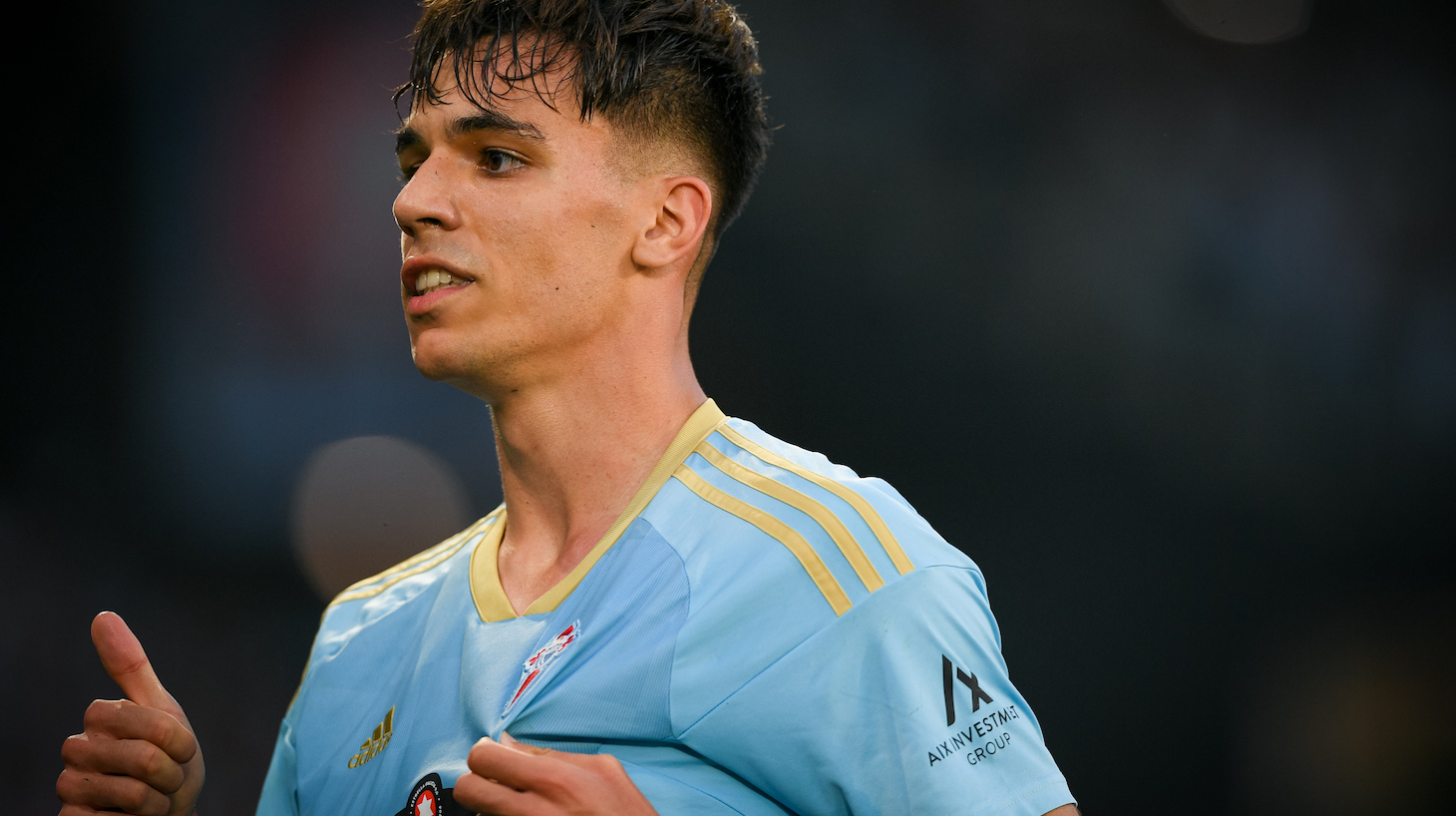Up to now, Gabri Veiga's story has been one European soccer is perfectly familiar with. The 21-year-old midfielder has long stood out as one of the more, but not necessarily most, talented Spaniards in his age group. This status as a promising but not quite blue-chip prospect saw him climb the ranks at one of the country's medium-sized clubs, in this case Celta Vigo, and collect a handful of caps in Spain's youth international teams.
Last year is when it all came together for him. Equipped with a newly adult body, the confidence of having earned a place on the fringes of Celta's first-team squad over the previous couple seasons, and the faith of his manager, Veiga exploded on the scene. He brought the power, hard work, and voracity of his game to La Liga and quickly emerged as one of the breakout young players of the season. That he filled the hard-running, goal-hungry, box-to-box midfielder role made him a refreshing departure from the traditional mold of a Spanish midfielder.
Combine his youth, tantalizing skill set, and high potential with Celta's standing as one of Europe's cheaper fishing wells (reports put his release clause around €40 million, a relative pittance for the buyers of today's market), and Veiga had all the makings of one of the game's hottest tickets this summer. The rumor mill linked him to several of soccer's elite: Real Madrid, Barcelona, Liverpool, Manchester City. When the chatter around moves to those huge clubs died down and instead centered on a deal that would send him to the reigning Serie A champions of Napoli, it felt like a perfect fit. Young studs at clubs like Celta are often breaking out, then getting snapped up by one of the big boys, only to get lost in the shuffle behind bigger and better players. It's how careers stall out before they've even really started. So for all who found themselves rooting for Veiga to continue his rapid growth at a club that most likely wouldn't bury him behind six even more expensive signings, Napoli looked like an ideal destination.
But that is where Veiga's story took a twist that would've been shocking any year except this one. Instead of heading to Napoli or some other European giant, Veiga has become the latest player to ditch the old continent for a stupidly lucrative move to Saudi Arabia. There is exactly one reason why this move has come together, so let's lay out the terms explicitly: Veiga reportedly earned something like €500,000 annually at Celta; Napoli was prepared to pay him €2.5 million; Al-Ahli was able to seal the deal by promising him €40 million over the life of a three-year contract, handing him more than €13 million per year. Even if those numbers are off a bit, which they probably are, the picture they paint is clear.
In a certain sense, the Veiga deal is unique even in light of the Saudi Pro League's other big coups this summer. It's hardly novel for older stars like Cristiano Ronaldo or Karim Benzema to travel to some far-flung land where they can wring a final, massive payday out of their declining careers before Death's scythe finally lands. Traditionally, it's been the U.S. handing out those money bags; this time it's Saudi Arabia. It's true that the Saudi Pro League has made way more, and way more impressive, signings of this kind than MLS has ever managed, but it still fits an established trend.
However, the SPL's reach into the European talent pool really has exceeded what other big-spending upstarts have managed. Neymar, Sadio Mané, Fabinho, Sergej Milinkovic-Savic, Aymeric Laporte, Allan Saint-Maximin, Franck Kessié, Rúben Neves, and Aleksandar Mitrovic, to name just some of them, are all in their primes. All of them could command large salaries and prominent places at the biggest clubs in the best leagues—or else somewhere in the Premier League, where even small clubs have become financial behemoths. None of those players would seem to be old or accomplished enough to already be thinking more about how much they can earn than how much they can win. And yet all of them have traded the money, glamor, and prestige of Europe for crazier money and nothing else in the Middle East.
Still, Veiga is different. You could argue that all the other SPL additions had hit a ceiling. Some had made it to one of Europe's biggest clubs, but had fallen out of favor, and couldn't find a similar-sized team to take on their salaries. Others had topped out as good but not great players for whom the game's elite were never likely to come knocking. But not only is Veiga nowhere near his ceiling, it isn't even clear yet whether he has one. This is one of Spain's more impressive young jewels (I don't want to overstate it; he's a legitimately great prospect, but not like a Pedri-level surefire superstar), on the cusp of what looked like a very smart move to what is currently the best team in Italy, primed to fight for a starting spot that, if he grabbed it with two hands, would likely launch him into the elite of the elite. Veiga was just getting started! And now it feels like it's already over! Of all the surprising transfers over the years that have taken provably good players away from Europe's top leagues, I can't think of one quite like Veiga's.
The European teams should be worried. What the Saudi Public Investment Fund has already done with its domestic league is genuinely unprecedented. MLS has never featured this many superstars, and has maybe literally never signed prime-aged players who remained coveted in the European market, of which Saudi Arabia now has more than a dozen. A close precursor to what we've seen from the Saudi Pro League was the Chinese Super League of about seven years ago, back when Chinese clubs' gargantuan salary offers successfully lured in several very good Europe-based players during a delirious couple transfer windows. But almost all of the CSL's big signings were players the European elite were no longer particularly interested in. And, after only a couple years, the Chinese government shut off the money faucet, bringing an end to the phenomenon.
So even compared to those recent forerunners, the Saudi Pro League has emerged as a real threat to the European soccer hierarchy, to an extent never before seen. There's no reason why they won't continue signing more and more big-name players and coaches (just to name a few managers they've already nabbed: Steven Gerrard, Jorge Jesus, Nuno Espíritu Santo, Slaven Bilic). You can call the league an uncompetitive joke, full of under-talented Saudi players and a sprinkling of ringers whose athletic aspirations there don't extend much further than sprinting to the bank, but if you look at some of the lineups the top teams can put out, you can't deny their strength. Bring in enough good players, and eventually the joke league becomes serious.
Armed with so many Champions League–caliber players, and with more money than God, you can understand why Saudi Arabia reportedly wants to try to buy itself a spot in the actual UEFA Champions League. And can you really rule out the possibility that the SPL does spend its way into the Champions League? Or that the SPL buys so many of the world's soccer stars that it becomes the de facto incarnation of the dreaded Super League soccer fans thought they'd killed off a couple years ago? At this point, it looks like the only limit on Saudi Arabia's ability to acquire a legitimately great league is the PIF's commitment to paying what it'll take to get there.
I have to agree with Jürgen Klopp: Soccer's golden exodus to Saudi Arabia is not, in fact, cool. However, I don't think it's entirely without precedent. More than Major League Soccer, more than the Chinese Super League, and more than something like Colombia's El Dorado period of the 1950s, what Saudi Arabia's ransacking of a continent's soccer system most resembles is the one Europe executed upon South America. Starting in the 1920s and lasting clear on through the '90s, the major clubs and leagues of South America were at the very least totally comparable to their European counterparts in the talent department. In those days, South American stars tended to stay home and play at least a significant chunk of their careers on the mother continent. And, South America being the world's most fertile ground for great players, this gave clubs in Brazil and Argentina and Uruguay etc. access to an almost unlimited crop of amazing players with which to construct some of the best teams anywhere.
Gradually, this began to change. European leagues started to loosen the often restrictive nationality requirements they imposed on their clubs, which opened up more roster spots for foreign talents. Economically, Europe as a whole grew steadily richer, while many South American countries experienced political and economic turmoil. That economic development, plus things like the popularity of the European Cup/Champions League and TV rights deals making the European game increasingly profitable, and, yes, out-of-market investments of shady money to build small clubs into big ones (it wasn't ticket sales that made Serie A the best league in the world during the '80s and '90s), meant there was more money in the coffers of the European clubs than in South America. All of this sent larger and larger transfer fees and salary offers from the Old World to the new one, which lured more and more South Americans from the local clubs and competitions they knew and loved to the greener pastures in Europe.
The shift in power wasn't overnight. Take the results from the old Intercontinental Cup (an annual contest between the winner of South America's Copa Libertadores and the European Cup) and the current Club World Cup. It's not a perfect measure, but I do think it's indicative. South American clubs won 20 of the 34 Intercontinental Cups from the first edition in 1960 to 1995. Since then, they've won just six in 28 tries across that tournament and the Club World Cup, and none since 2012. I set the cutoff at 1995, since that was the last year before the Bosman ruling changed soccer forever.
Jean-Marc Bosman is to soccer what Curt Flood is to baseball. The famous court decision that bears Bosman's name gave players far more freedom to choose their employers, which had the effect of fully throwing open the floodgates that now send so many promising prospects from South America to Europe. Since Bosman, South Americans go to Europe at earlier ages and in far greater numbers than they had before. This has crippled the continent's leagues, which still haven't recovered.
There is more than a touch of irony to the sight of Europeans whining about how Saudi Arabia is now doing to them what they did to South America. And I think the comparisons between the two are strong. Romantics might want to tell themselves that Europe's clubs were always bigger than the South American ones they raided, and that it was the prestige of the European game that caught the players' eyes at least as much as the money. There's some truth to that, but only some.
The foremost driver behind the decades-long South American soccer diaspora across Europe was money, far above all else. I'm sure many of those ocean-crossing players really had dreamed of pulling on Real Madrid's iconic white jerseys since their youths, but I think that only explains a small amount of the phenomenon. The Western-centric worldview might obscure this fact, but South America's teams and leagues are very, very popular at home. I believe that almost every single gifted Argentine tween dreams first of donning the national team's white-and-sky-blue shirt, and/or River Plate's white-with-a-red-sash far before they think about even Manchester United's red, let alone Brighton's colors.
To the extent that that has changed, it is a recent phenomenon that reflects the state of technology, which allows Europe to beam their matches all over the planet—that, and the hundreds of South American soccer greats who crossed the pond for decades and decades dreaming not of glory and but of cold, hard cash. It's useful to recall the specifics of the halcyon image of a South American genius working his magic for a great European club, which originates with Alfredo Di Stéfano. Di Stéfano left River Plate for money reasons, signed with Millionarios (the highest-spending club in Colombia's newly professional league, which had broken away from FIFA so that it could steal great players from clubs around the world by offering players staggeringly large contracts but not paying transfer fees to the clubs) for money reasons, left Millionarios when FIFA clamped down, and signed with Real Madrid in the back half of his prime for, you guessed it, money reasons. That is in no way a criticism of Di Stéfano, nor does it undermine his legacy and importance. But it does show that if South Americans dream of playing in Europe for the glory, it's only because their predecessors first made that trip for the gold.
I don't mean to draw a false equivalence between, say, La Liga and the SPL, or to argue that there's nothing concerning about what's happening today because something similar has already happened before. But I do want to point out that without a global, historical perspective, you can't really establish a solid footing for a strong critique of what is going on at present.
For instance, the obvious counter to my argument that Europe was once in the position Saudi Arabia is today is that Europe is more or less good, politically speaking, and Saudi Arabia is very bad. This is the argument often trotted out when whiny Euros (are you sensing a trend?) cry about traditionally big clubs losing players to the state clubs of Paris Saint-Germain and Manchester City. There is something to that line of argument, but not in the way it is often made.
What I think is missing from criticism of the state-backed clubs or now of the Saudi Pro League is recognition of the West's own place in the world. Qatar, Saudi Arabia, and the UAE all do terrible things, that is certain. But the Western world is far from innocent itself.
The pat morality play that pits the righteous Barcelonas and Premier Leagues against the nefarious Man Citys and SPLs relies on taking the world's geopolitical status quo for granted. The status quo should not be treated as, at worst, some morally neutral baseline. The state of our world, for good and especially for bad, has much more to do with the influence of the United States, England, Germany, and the finance capitalists that own many of soccer's non-state-backed mega-clubs than it does with the Middle East's royal families. Hell, the Middle East looks the way that it does in large part because Western forces like the U.S. and England made it so.
It may be indirect, but there is a clear relationship between the West's imposed world order and the poverty in the Global South that inspires players like Roberto Firmino, Malcom, Sadio Mané, and Kalidou Koulibaly to prioritize above all else the amassing of as much money as possible, to release as many of their family members as possible from the crushing poverty that is commonplace where they or their parents came from. I doubt a Spaniard like Gabri Veiga grew up the same way a Senegalese like Mané did, but even his financial insecurity owes its source to the way the powers in the West have decided the world should work. The sanctimony about the Champions League's prestige versus Saudi Arabia's soccer robberies threatens to hide the much more significant robberies that built a West that could develop and, yes, buy the Champions League's prestige, one South American superstar at a time.
Now, as I said before, I don't want to draw false equivalences, and I do think what is happening with soccer right now is bad. But those feelings need to be investigated. Part of why the SPL stuff feels so wrong is because at least the European soccer system is tethered to something that feels real and objective: to the actual business of soccer. When Real Madrid signs Jude Bellingham for a fortune, you can point to Real's revenue numbers, and the UCL TV rights deal, and the size of the club's globe-spanning fanbase, and in those things find a justification for why it seems right that Real paid so much for Bellingham while it seems wrong when Al Hilal pays so much for Neymar. But market logic, though it pretends to be as natural as gravity, is itself ideological, and isn't the only valid way to look at the world. In fact, if the reductive, totalizing, and alienating logic of the market is behind so much of the West's sins on the world stage, then Saudi Arabia's eschewing of it in favor of a worldview that prioritizes what can't be strictly quantified—in this case, improving the country's image—is an escape from that alienating market logic.
But there I think you can find what truly is troubling about the Saudi Pro League and PSG and Man City and the like. The world the Saudi and Qatari and Emirati royal families are trying to fund into existence isn't any better than what we have now. These Middle Eastern powers don't actually object to poverty or even to the West's market logic; all they're really after is a prominent seat for themselves at the table that already exists. Economic and political equality shrouded behind glitz and glamor that is accessible only to a small few is exactly what defines their rule in their own countries. Ronaldo, Neymar, Mané, and Veiga are just more window dressing to get everyone to marvel at their riches while ignoring the subjugation that underlies it.
So what do we do here? Who do we root for? As is usually the case, you're on safest ground when you try to stick close to the actual people. I won't cry for Napoli losing out on Veiga or Barcelona failing to bring Neymar back, but I do think it's a shame that the millions of people who make Napoli and Barcelona and even soccer itself everything they are are now having all of that put into jeopardy because some rich and evil assholes want some shiny new toys. Despite what today's moralizers might have you believe, the industry of soccer has always been tightly intertwined with money and corruption. But none of that has prevented the players and the fans from creating unforgettable memories, clubs and competitions that really mean something, and a sport that, as corny as it sounds, is truly important.
Saudi Arabia is trying to put together an ersatz version of the game stripped of that history, sentiment, locational specificity, and socio-political importance. Instead, their version is to be gaudy and sanitized, a signifier shorn of the context that provides its soul, an unbelievably expensive advertisement for the financial might of terrible people. The stadiums will have big stars, lots of money, no beer, well-behaved fans, and neat little plays from players who trample on a field laid by a parade of human rights atrocities. The danger is that the trick just might work.
I don't know if the Saudi Pro League will eventually become the new Super League, or if it'll fizzle out in a couple years the same way the Chinese attempt did. But I do know that this is only the latest escalation of several trends that have gone back for generations. It wasn't the Saudis who made soccer a business, a product, an asset to buy and sell and relocate to wherever the highest bidder would like. Since the dawn of the game, the way to attain soccer greatness has been to find money from outside the sport itself and pour it into a club, and in doing so buying the biggest advantage there is. PSG and the Saudi Pro League are only venturing further out on that same continuum. Likewise, for years now the European clubs have been more than happy taking the Middle East's blood-and-oil money in the form of inflated transfer fees and shirt sponsorships. What's happening now is only the Middle Eastern powers wanting more of what they've already been buying.
The business of soccer has become its own game, and if it turns out that the Middle Eastern royal families now play that game the best, Europe's big clubs have no one to blame but themselves.






